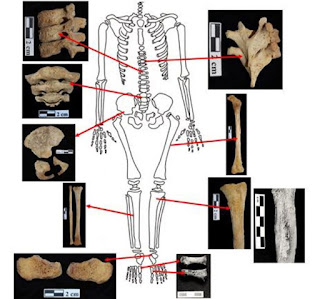With COVID-19 grabbing much of the world's attention in the last two years, all other diseases have taken a backseat, yet they remain no less dangerous. One such disease getting buried in the covid hysteria is cancer. The second leading cause of death in the United States, cancer is one of the most prevalent diseases of modern times. A chilling fact is that nearly one in three (33%) Americans will get cancer in their lifetime. The mortality rate is equally grim—an estimated 600,000 people died of cancer in 2020 in the United States alone, nearly double the number of deaths (~350,000 in 2020) attributed to the coronavirus!
 |
| Purple ribbon symbol for cancer. |
While there's no doubt that the incidence of cancer has increased in recent times, it is by no means a modern disease. Cancer has existed since ancient, even pre-historic times! Paleontologists recently discovered cancer in dinosaur fossils from 70 million years ago. In humans, the earliest evidence of cancer was found in a 1.7 million-year-old bone.
The earliest written record of cancer, not surprisingly, comes from the Egyptians. The Edwin Smith Papyrus, a part of an ancient Egyptian textbook on trauma surgery dating back to 3000 BC, describes eight cases of tumors occurring on the breast. It was also recorded that there was no treatment for the disease, only palliative treatment. Evidence also suggests that ancient Egyptians were able to differentiate between malignant and benign tumors, and surface tumors were surgically removed, much like they are today. Cauterization, which involved destroying tissue with a hot instrument called “the fire drill” was also used to treat tumors.
Archaeologists have also used a group of cancer-ridden mummies to estimate the prevalence of the disease in ancient times. After finding six cases of cancer in a group of 1087 ancient Egyptian mummies, and assuming the group is a representative population (which I thought was a bit of a stretch), they concluded that the prevalence of cancer was around 1 in 200 cases (6/1087), or about 0.5% of the population got cancer.
 |
| Mummy of an ancient Egyptian man with cancer |
 |
| Bones of a mummy riddled with holes thought to be caused by bone cancer |
Today, western societies have a cancer rate of 1 in 2 (50%), which means we are 100 times more likely to get cancer than ancient Egyptians. As ominous as that sounds, it is tempered by the fact that the life expectancy back in those days was much lower than now, and the chances of survival after cancer are much higher today with modern medicine. As we overcome the great pandemic of 2020 (or is it 2019?) with the miracle of modern medicine (thanks in large part to a vaccine that was developed in record time!), here's to finding a cure to that ancient scourge of cancer that continues to plague us today. Perhaps the mRNA technology, the very same medical technology that has brought hope to ending the pandemic, will lead us there!
Sources:
https://www.livescience.com/62908-ancient-egypt-cancer.html
https://www.sciencedaily.com/releases/2017/12/171214101215.htm
https://www.sciencealert.com/ancient-egypt-dakhleh-six-cancer-cases-ovarian-cervical-testicular-rectal-leukaemia
https://www.livescience.com/62908-ancient-egypt-cancer.html
https://www.sciencedaily.com/releases/2017/12/171214101215.htm
https://www.sciencealert.com/ancient-egypt-dakhleh-six-cancer-cases-ovarian-cervical-testicular-rectal-leukaemia
https://www.nature.com/articles/nrd.2017.243
Comments
Post a Comment